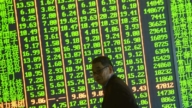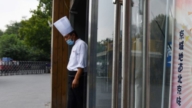【新唐人2014年08月16日訊】據中共央行日前發佈的數據,7月份中國總社會融資僅為6月份的七分之一,創下了全球金融危機以來最低月讀數。同時央行新增貸款只有6月份的三分之一。專家指出,中國經濟全面出現蕭條,有錢人已經外逃,國內百姓不知貸款有何用處,中共面臨全面崩潰。
據央行網站8月13號消息,今年7月份社會融資規模為2731億元,比上月減少了1.69萬億元,比上月大降86%。
而7月份國內銀行新增貸款也在急劇下降。 7月全國新增貸款額為3852億元,與6月的1.08萬億元相比,下降了三分之二。
中國獨立經濟評論家牛刀:「人家還去貸款嗎,把房子賣掉了,換成美元走了,誰去貸款?它到了全面崩潰的時候,還在這裡放水。貸款就是沒人貸,大家都欠錢,都在過過日子,大家不知拿這個錢幹甚麼,日子過不下去了,人家貸款幹甚麼,多少人跳樓啊現在。」
近期中國中小企業和房地產開發商,跳樓跑路現象頻頻發生。
湖南省標榜的「帶領農民奔小康的領軍人物」肖仲望,因其省級科技型農業化公司,無法償還超過億萬元的借款而自殺。湖南「恆盾集團有限公司」,「金鷹服飾集團」等員工過千的大公司,老闆也因為資金鍊斷裂而跑路或跳樓。
而在江蘇吳江、浙江嘉興等紡織業聚集地,去年下半年來,已經有超過40名紡織企業老闆跑路。
即使在以炒房聞名的溫州,棄房現象也很嚴重。根據溫州銀監分局去年的數據,截止到去年7月末,溫州各類「棄房跑路」案例就有595例。而到了今年一月,溫州商品房均價,與2011年的最高點相比,降幅已經達到42%,導致不少炒房團成員跳樓自殺。
與此相反的是,今年5月,央行仍然鼓勵商業銀行向房企房貸。8月8號,福建出臺房地產救市政策,要求銀行增加房地產貸款。
而在今年4月,中共採取了為小企業減稅,增加有針對性的基建開支,以及在農村地區和針對小企業的信貸優惠政策,等等所謂「微刺激措施」。
美國南卡羅來納大學艾肯商學院教授謝田:「經濟上的全面混亂,一方面中央政府又在搞甚麼微刺激,另一方面,地方政府債務不斷擴大,他們也感到破產的危機,就想靠賣地賺錢,但是房地產市場,人們也看到了這個市場泡沫的破滅,幾種力量交織在一起,現在它是進也不是,退也不是。」
牛刀:「這很危險,這比日本泡沫破滅前的跡象還要鮮明。這全是你共產黨動員大家去貸款的,最後出了事人家都找你政府,這個政府承擔不了責任,這一次崩掉了,那就是整體的全部崩掉了,包括它的政治經濟都要出問題。」
作為中國房地產最具影響力的獨立評論家,牛刀在今年5月發文《中共高層已經在為處理房地產泡沫處理後事》,他在文中指出,海南房地產泡沫破滅後證明,只有民主政府才能做到承擔房地產泡沫風險,但在中國,承擔風險的一定是個人。
他指出,今年4月,國資委要求長期在樓市「挖礦淘金」的78家央企,加速退出房地產市場;5月份又頒發規範商業銀行同業業務治理的「9號文」,收緊信用,並再次斬斷房地產的資金鍊。種種跡象表示,高層正在為房地產收屍,國際資本正在逃離中國。
另一方面,2009年以來,中國已成了全球最大的"印鈔機",老百姓的財富不斷遭到稀釋。去年人民幣發行量超過120萬億,是GDP的兩倍,據人民銀行資料,今年前面7個月,又印出超過80萬億鈔票。
牛刀:「還在這裡拚命的印鈔,還在拚命的放貸,他就是放水也沒有用,就表明天前面的那些刺激經濟全部是失敗的,可能也就是它中共歷史上最後一次放水。」
另外,中國工業產出和固定資產投資增長,也在七月份出乎意外的放緩。
採訪編輯/劉惠 後製/蕭宇
Does The Unexpected July Credit Dive Mean The Start Of The Final Collapse?
According to recently released CCP Central Bank data,
China’s total July social financing amount is only one seventh
of that in June – which is the lowest monthly level
since the global financial crisis.
At the same time, the central bank’s new loans
are only one-third of June’s.
Experts have pointed out that an economic depression has
fully occurred in China and the wealthy have fled overseas.
Citizens have no reason to apply for new loans,
and the CCP is facing a total collapse.
According to news released by the central bank’s website
on Aug. 13, the scale of social financing in July
is 273.1 billion yuan, which was reduced by 1.69 trillion yuan
from last month’s, and it is a 86 percent drop from last month.
In addition, new loans issued by domestic banks have also
declined sharply in July.
In July, the amount of entire nation’s new loans was 385.2
billion yuan, compared to 1.08 trillion yuan in June.
This is a drop of two-thirds.
Chinese independent economic commentator, Niu Dao:
“No one will apply for loans, people all sell their houses,
exchange their money into US Dollars and leave.
Who would apply for loans?
The time of total collapse has been reached
and it still wants to make money.
No one will apply for loans, everyone already owes money
and just want to maintain their living.
People have no uses for loan money.
There is no point of asking for loans when they cannot
even live, so many people have jumped off buildings now."
Recently, many Chinese real estate developers and people
in small and medium enterprises have committed suicide
or absconded.
Xiao Zhongwang, who was known as ‘the leader of peasants
to their wealth’ in Hunan Province committed suicide when
his provincial agricultural science and technology company
was unable to repay loans of over one hundred million yuan.
The Hengdun Group Ltd. and Jinying Dress Group in Hunan
are all large companies with thousands of employees,
yet their owners jumped off buildings
or absconded because their funding chain broke.
In Wujiang City of Jiangsu, Jiaxing City of Zhejiang
and other textile industry commercial areas, more than
40 textile business owners absconded since the second half
of last year.
Even Wenzhou, which is known for its real estate speculators,
has a serious abandoned building issue.
According to last year’s data from the Wenzhou Banking
Branch, by the end of July last year, there were 595 cases
of all kinds of ‘abandoned buildings and absconding.’
In Jan. of this year, the average Wenzhou commercial
housing prices dropped 42 percent from their record high
in 2011, causing many real estate speculators to commit
suicide by jumping off buildings.
In contrast, in May this year the Central Bank still encouraged
commercial banks to loan to real estate enterprises.
On Aug. 8, Fujian launched a bailout policy for the real estate
market, which requires banks to increase real estate loans.
In April this year, the CCP adopted many so-called ‘Micro-
stimulus measures’ such as tax-reduction for small enterprises.
Targeted infrastructure spending increased, and preferential
policies for credit in rural areas and for small enterprises.
Professor at University of South Carolina Aiken, Frank Xie:
“It is full economic chaos.
On one hand, the central government has engaged
in the so-called micro-stimulus.
On the other hand, local governments’ debts are still
expanding, they also feel the bankruptcy crisis and want
to earn income via real estate.
However, people also see the real estate bubble bursting,
and these forces combined has created a dilemma."
Niu Dao: “This is very dangerous, the signs are more apparent
than Japan’s bubble burst.
You CCP encouraged everyone to take loans, and now things
turned bad, and everyone is coming to you.
The government is unable to take this responsibility.
This collapse will be an entire collapse in all aspects
including economically and politically.
As the most influential independent real estate commentator
, Niu Dao published an article, “CCP Top Level Is Arranging
Funeral For The Real Estate Bubble" in May this year.
The article addresses the bursting of Hainan’s real estate
bubble, proving that only the democratic government
is capable of bearing the risk of the real estate bubble,
however in China, it is individuals who have to bear the risk.
He pointed out that in April of this year, the State-owned
Assets Supervision and Administration Commission had
asked 78 central enterprises that always ‘dig gold’
in the real estate market to quickly quit the market.
The ‘No. 9 Document’ which regulates the commercial
banking business operation was issued in May in order
to tighten credit, and real estate’s funding chain
was cut off again.
All signs indicate that the top level is breaking away from
real estate, and international capital is fleeing China.
On the other hand, since 2009, China became the biggest
money printing machine in the world.
People’s wealth is constantly being diluted.
Last year, more than 120 trillion yuan was issued,
two times the GDP.
According to data from the People’s Bank, in the first seven
months of this year, more than 80 trillion yuan was printed.
Niu Dao: “Continuing to desperately print money
and issue loans is ineffective, all the previous
economic stimuli have failed, and it will probably
be the last time for the CCP does so."
Moreover, China’s industrial output and fixed asset
investment growth also unexpectedly slowed down in July.
Interview & Edit/LiuHui Post-Production/XiaoYu




























